Mental fatigue in athletes is a crucial yet often overlooked aspect of sports performance. Unlike physical fatigue, which is more easily recognized and addressed, mental fatigue can subtly undermine an athlete's abilities, leading to decreased performance and increased risk of injury. Understanding the signs of mental fatigue is essential for athletes, coaches, and support staff to maintain optimal performance levels and overall well-being.
Recognizing the Symptoms of Mental Fatigue
Signs of mental fatigue can manifest in various ways. Athletes may experience a decline in concentration, making it difficult to focus on tasks or strategies during training or competition. This lack of focus can result in mistakes that are uncharacteristic for the athlete, such as missing a target in archery or failing to execute a play in team sports.
Additionally, mental fatigue can lead to irritability and mood swings, making it challenging for athletes to maintain a positive attitude and collaborate effectively with teammates.
Cognitive Impairment and Decision-Making
Mental fatigue significantly impacts cognitive functions, including decision-making and reaction times. Athletes may find themselves second-guessing their choices, leading to hesitancy during critical moments of competition.
For instance, a soccer player might delay a shot on goal, resulting in a missed opportunity. Research has shown that mental fatigue can slow reaction times by as much as 20%, which can be detrimental in fast-paced sports like basketball or hockey.
The Role of Motivation and Engagement
Another sign of mental fatigue is a noticeable decrease in motivation and engagement.
Athletes may feel less enthusiastic about training sessions or competitions, which can lead to a lack of effort or diminished performance. This disengagement can stem from prolonged stress, overtraining, or burnout, all of which can contribute to an athlete's mental exhaustion. Coaches should be vigilant in monitoring their athletes' attitudes and energy levels, as these can be indicators of underlying mental fatigue.
Physical Symptoms Linked to Mental Fatigue
While mental fatigue primarily affects cognitive and emotional states, it can also manifest physically. Athletes may report headaches, muscle tension, or gastrointestinal issues, all of which can detract from their performance. These physical symptoms often arise from the body's stress response to mental fatigue, illustrating the interconnectedness of mental and physical health.
Recognizing these signs is crucial for athletes to address their overall well-being effectively.
The Impact of Sleep on Mental Fatigue
Sleep plays a vital role in managing mental fatigue. Athletes require adequate rest to recover both physically and mentally.
Insufficient sleep can exacerbate symptoms of mental fatigue, leading to a vicious cycle of decreased performance and increased stress. Studies indicate that athletes who prioritize sleep experience improved focus, decision-making, and overall performance. Therefore, implementing good sleep hygiene practices is essential for athletes aiming to combat mental fatigue.
Strategies for Managing Mental Fatigue
To combat mental fatigue, athletes can employ various strategies. Mindfulness techniques, such as meditation and deep-breathing exercises, can help athletes regain focus and reduce stress. Additionally, incorporating regular breaks during training and competition can prevent burnout and promote mental recovery.
Coaches can also foster a supportive environment that encourages open communication about mental health, allowing athletes to seek help when needed.
The Importance of Professional Support
Recognizing the signs of mental fatigue is just the first step; athletes may benefit from professional support, including sports psychologists or mental performance coaches. These professionals can provide tailored strategies to help athletes manage their mental fatigue effectively.
They can also assist in creating personalized mental training programs that enhance resilience and coping skills, further promoting optimal performance.
Conclusion: Prioritizing Mental Health in Sports
In conclusion, mental fatigue is a significant concern for athletes that can profoundly impact their performance and overall well-being. By understanding the signs and symptoms of mental fatigue, athletes, coaches, and support staff can work collaboratively to create an environment that prioritizes mental health.
Addressing mental fatigue is not merely about improving athletic performance; it is about fostering a culture of well-being that supports athletes in their journey, both on and off the field.
